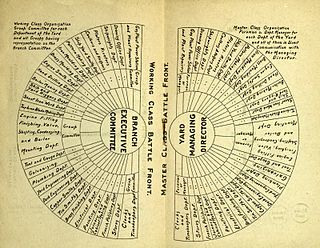| Founded | 1898 |
|---|---|
| Date dissolved | 1971 |
| Merged into | Transport and General Workers' Union |
| Members | 12,000 (1912) |
| Journal | Highway [1] |
| Affiliation | TUC, STUC, Labour |
| Office location | 308 Albert Drive, Glasgow |
| Country | United Kingdom |
The Scottish Commercial Motormen's Union was a trade union in the United Kingdom. It merged with the Transport and General Workers' Union in 1971.
A trade union, also called a labour union or labor union (US), is an organization of workers who have come together to achieve many common goals, such as protecting the integrity of their trade, improving safety standards, and attaining better wages, benefits, and working conditions through the increased bargaining power wielded by the creation of a monopoly of the workers. The trade union, through its leadership, bargains with the employer on behalf of union members and negotiates labour contracts with employers. The most common purpose of these associations or unions is "maintaining or improving the conditions of their employment". This may include the negotiation of wages, work rules, complaint procedures, rules governing hiring, firing and promotion of workers, benefits, workplace safety and policies.

The United Kingdom, officially the United Kingdom of Great Britain and Northern Ireland but more commonly known as the UK or Britain, is a sovereign country lying off the north-western coast of the European mainland. The United Kingdom includes the island of Great Britain, the north-eastern part of the island of Ireland and many smaller islands. Northern Ireland is the only part of the United Kingdom that shares a land border with another sovereign state—the Republic of Ireland. Apart from this land border, the United Kingdom is surrounded by the Atlantic Ocean, with the North Sea to the east, the English Channel to the south and the Celtic Sea to the south-west, giving it the 12th-longest coastline in the world. The Irish Sea lies between Great Britain and Ireland. With an area of 242,500 square kilometres (93,600 sq mi), the United Kingdom is the 78th-largest sovereign state in the world. It is also the 22nd-most populous country, with an estimated 66.0 million inhabitants in 2017.

The Transport and General Workers' Union was one of the largest general trade unions in the United Kingdom and Ireland - where it was known as the Amalgamated Transport and General Workers' Union (ATGWU) to differentiate itself from the Irish Transport and General Workers' Union - with 900,000 members. It was founded in 1922, and its first general secretary was Ernest Bevin.




